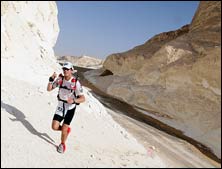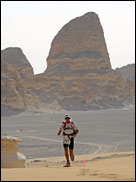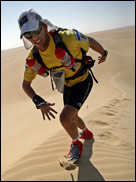So why does he do it? Simple, because 'Normal is boring,' he says.
This local phenomenon is only 26 years old and started running a mere two and a half years ago. This year alone he has completed the gruelling six-day, 250 km Sahara Desert Race, in which he won every stage and completed the race in a total time of 27 hours and 17 min - three hours ahead of the next competitor, the legendary Dean Karnazes.
He also competed in the equally challenging Gobi Desert race earlier in June, in which he also won every stage.
Ryan Sandes in action during the Sahara Desert Race earlier this year.
How does he do it?
There's marathon running and then there's this sort of ultra-marathon running which is not only physically challenging but mentally taxing too. And Sandes won two of these exceptionally difficult races in the harshest of circumstances.
Ryan Sandes makes his way through the Sahara desert.
So why does he do it and why does he choose such extreme races? "I enjoy the challenge as the harder it is, the more rewarding it is when you have achieved your goal. These desert races are in some of the most remote places in the world and you lose touch of reality while competing in them. It's also a nice escape from everyday life," he says.
How Sandes trains
Sandes has attracted a lot of attention since he exploded onto the running scene. He trains at the Sport Science Institute and also works with Nicholas Tam (BSc (Med.) Hons in Exercise Science) at the University of Cape Town where he makes use of their heat chamber to train in.
Tam explains that the heat chamber is used to acclimatise Sandes by replicating the conditions that he would experience during the race. The heat chamber is a room in which there is a treadmill/stationary bike and the conditions are controlled; such as wind speed, temperature and humidity. This was to recreate what the expected environmental conditions would be. It works by gradually building up the time he spent in those conditions, which was initially 15 minutes to two hours.
"Acclimatising him in the chamber allows his body to adapt to the environmental conditions and allows him to perform to his maximum potential instead of his body initially being shocked and taking time to adapt to the conditions," says Tam.
Apart from helping Sandes to train, Tam and his colleagues have also been observing him to try and find out exactly what the X-factor he has is, and how it works.
"We think that he is probably more efficient than most athletes and that he trains specifically for these specific races which allows his body to recover, whilst some of his top competitors run marathon after marathon, like Dean Karnazes. But we also think he seems to be able to run quite comfortably in the extreme conditions which infers he must have some physiological adaption to running in the heat but we still need to clarify that," Tam says.
He adds that it appears Sandes' size is also what gives him the edge over some of his more bulky counterparts as he is able to dissipate the heat easier and produce less internal heat. Although Tam says he also has youth and very admirable discipline and mental determination which give him a definite edge.
"Mental strength is probably one of the key factors that sets apart the good runners from the best. The belief in their ability to succeed and the ability to tolerate physical barriers are important. Ryan ran weekend runs for six to eight hours at a time which mentally prepared him to develop coping mechanisms and establish limits," Tam said.
Sandes prefers trail running such as this, to road running.
Trial running is mentally demanding
Mental preparation for the race is almost as important as physical training for the race, Sandes says, adding: "ultra endurance races are 60% mental and 40% physical. You need to be really mentally fit as you can have as much talent and be as fit as you want ,but if you are not mentally strong you will really struggle. There are times when your body says 'stop' but I focus on the positives and tell it to keep going."
After completing two punishing races this year, Sandes says that the 250km Gobi race was the toughest and required him to push himself harder. But pushing so hard comes with its own consequences.
"I nearly collapsed from the heat on the long stage but did not stop as I knew if I wanted to win I had to keep going. The Sahara race was quite mentally hard as running out in front on your own your mind plays games with you and I felt like a wild animal being hunted."
Climbing up one of the sand dunes during the Sahara Desert race.
So what do you think about for hours on end when you're running through a deserted desert in the boiling sun for days on end?
"At times training can get tough, especially when you are at the start of an eight-hour run, but I try focusing on the positives, such the surroundings and my future goals. Training in the mountains around Cape Town is awesome and time flies by and I feel like I am in my on world up there.
"I also try and beak the race up into a number of smaller sections (+-10km) and just focus on getting through that section. This helps me mentally as if you are going through a rough patch during one of the sections, I think of the new section as a new race and mentally you feel a lot stronger. When it gets tough and it is so hot you feel like you are suffocating, I ask myself questions like what am I doing here? But the positives outweigh the negatives and it is an incredible feeling being out there," he says.
Trial running vs. road running
There are major differences between running a road race marathon and running through the desert for six days, but Sandes says these differences are what appealed to him.
"The terrain changes the whole time and one minute you're running in ankle-deep sand then the next minute you are running on a mass of rocks. I think trail running is a lot more exciting and you get to run in a lot of awesome places.
"It's also more technical and the terrain is more extreme and in general the pace is a bit slower than road races. But I do enjoy road races and after doing a lot of training on the trails, I sometimes miss the tar. It is an awesome feeling to be really fit and to run a 10km race really fast. You almost feel as if you are invincible," he says.
Training for a desert race
Despite having a full-time working as a quantity surveyor for Faircape Property Developers, Sandes still manages to find time to train after work and normally trains in a three to four-week cycle, starting off with an easy week which builds up to a difficult week.
His "average" weekly programme when training for a race, which is not for the faint-hearted, would go something like this:
- Monday: Gym in evening and sauna after
- Tuesday: Run for 15 to 25km including running in environmental chamber (1hour on road plus 40min to an hour in chamber)
- Wednesday: Run for two to three hours on trails/mountain (with back pack)
- Thursday: Run 15 to 25km, including running in an environmental chamber (1hour on road plus 40min to an hour in chamber)
- Friday: Gym
- Saturday: Three to nine-hour run on trails /mountains (with pack)
- Sunday: three to six-hour run on trails /mountains (with pack) plus gym and sauna.
"I also try and run at least two 'big weekends' where I run four consecutive long runs in a row (Friday/Monday). Gym is also important as I makes your muscles stronger and prevents injuries," he says.
Future races on the cards
Having won both big races this year Sandes now has his sights firmly set on a 250km self-supporting race in Namibia in May, Tuffer Puffer in August, the Odyssey in October and the Trans 333 in the Sahara in November - a 333km non-stop race in the Sahara desert. As if that wasn't enough to keep him busy, he's also hoping to find time to participate in a few charity races in between.
When you're the only person for miles and miles in the barren, hot desert, you have the be as mentally fit as you are physically able.
How does he keep it up? "Sleep less and have no social life," he jokes, but adds: "I get to work really early and then leave at 4pm to go and train. My boss at Faircape Property Developers is really understanding and supportive, but at times it does feel like everything is getting a bit too much. I suppose I can sleep when I am dead!"
Advice for aspiring trial runners
Despite his enthusiasm and dedication to running, Sandes is also realistic and is the first to point out that it takes a lot of hard work, and not all of it is easy.
"During the race, the hardest part is the heat. It makes you feel like you are suffocating and your entire body feels lifeless. During the Gobi race in China this year, I thought I was going to pass out from the heat and started to get dizzy. Getting there is also tough as it costs about R60 000."
But it's not hard to see that Sandes is passionate about running and really is living his dream – and he says that anyone who is determined enough can do the same.
"If you are determined enough and want something bad enough, then you can achieve it with hard work and dedication. But you have got to have fun and enjoy what you are doing."
Follow Sandes' future races at http://www.ryansandes.com
(Amy Henderson, Health24.com, December 2008)
Read more:
From slob to Superman
Running - the best choice?




 Publications
Publications
 Partners
Partners


















